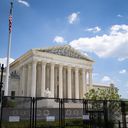Supreme Court's next term could be just as contentious

The most recent Supreme Court term ended with its conservative majority getting rid of major precedents — most notably Roe v. Wade — and setting new ones on religion and guns.
Driving the news: With a 6-3 majority, the next term — which is set to start in October — could be just as big. Here's a look at some of the most prominent cases the court has already agreed to hear.
Moore v. Harper
This case examines a legal theory that would grant state legislatures significantly more power over federal elections.
Details: The case involves a map drawn by North Carolina's Republican-led legislature that was rejected by the state's supreme court for partisan gerrymandering and violating the state constitution.
- Republican lawmakers said that the state court lacks the authority to reject the map under a legal theory called the independent state legislature doctrine, which is derived from the U.S. Constitution.
- The North Carolina Supreme Court said that this would be "repugnant to the sovereignty of states" and "would produce absurd and dangerous consequences."
What we're watching: If the Supreme Court sides with the doctrine in question, it would grant state lawmakers the power over redistricting and election procedures, such as voting by mail, The Washington Post reports.
303 Creative LLC v. Elenis
The court is hearing a free-speech case of a Colorado-based web designer who says she should not be forced to create websites for same-sex weddings under state law.
Details: Lorie Smith's attorneys argue that a federal court siding with a Colorado law that says she must "work with all people regardless of ... sexual orientation" violates her First Amendment rights.
- The justices will be answering the question of whether applying a law "to compel an artist to speak or stay silent violates the Free Speech Clause of the First Amendment."
- The 10th Circuit Court of Appeals had denied Smith's attempt to overturn a lower court's decision to throw out her case, saying that Colorado must protect the interests of marginalized groups under the Colorado Anti-Discrimination Act.
What we're watching: A decision in this case could potentially allow business owners to discriminate against marginalized groups — mainly the LGBTQ community — based on their beliefs.
Students for Fair Admissions' challenges to affirmative action
The court is hearing a pair of cases challenging the consideration of race in college admissions processes.
Details: The challenges — one against Harvard, a private institution, and the other against the University of North Carolina, a state school — argue their admissions processes discriminate against Asian American applicants.
- Both cases were brought by the conservative nonprofit Students for Fair Admissions (SFFA).
- Lower courts have rejected SFFA's claims, pointing to decades of high court rulings affirming the use of race in college admissions.
Worth noting: The Biden administration last year urged the Supreme Court to reject the challenge to Harvard's affirmative action policy, arguing that SFFA has not proven the "special justification" needed to overturn precedents on affirmative action.
What this means: The conservative high court's ruling could determine the future of affirmative action in higher education.
Merrill v. Milligan
The court in February ruled that Alabama state officials are not required to redraw its congressional district maps, which a lower court had said violated the Voting Rights Act (VRA) by diluting Black voting power.
Details: The court's order said that state officials did not have to follow the lower court's decision while the case moved forward, and agreed to hear it in the fall.
- The high court did not say when they would hear the case, meaning that the GOP-drawn map will be used in the 2022 elections, considering will hear oral arguments on this case before the fall.
- In her dissent, Justice Elena Kagan said that "[a]ccepting Alabama's contentions would rewrite decades of this Court's precedent" about the VRA.
What we're watching: A ruling in the case upholding the Alabama district map could impact how lawmakers in other states draw their congressional district maps.
- In Louisiana for example, a case on whether lawmakers must redraw district maps was put on hold until the justices reach a decision on the Alabama case.